Psychological and pharmacological interventions for depression in patients with coronary artery disease
- PMID: 34910821
- PMCID: PMC8673695
- DOI: 10.1002/14651858.CD008012.pub4
Psychological and pharmacological interventions for depression in patients with coronary artery disease
Abstract
Background: Depression occurs frequently in individuals with coronary artery disease (CAD) and is associated with a poor prognosis.
Objectives: To determine the effects of psychological and pharmacological interventions for depression in CAD patients with comorbid depression.
Search methods: We searched the CENTRAL, MEDLINE, Embase, PsycINFO, and CINAHL databases up to August 2020. We also searched three clinical trials registers in September 2021. We examined reference lists of included randomised controlled trials (RCTs) and contacted primary authors. We applied no language restrictions.
Selection criteria: We included RCTs investigating psychological and pharmacological interventions for depression in adults with CAD and comorbid depression. Our primary outcomes included depression, mortality, and cardiac events. Secondary outcomes were healthcare costs and utilisation, health-related quality of life, cardiovascular vital signs, biomarkers of platelet activation, electrocardiogram wave parameters, non-cardiac adverse events, and pharmacological side effects.
Data collection and analysis: Two review authors independently examined the identified papers for inclusion and extracted data from the included studies. We performed random-effects model meta-analyses to compute overall estimates of treatment outcomes.
Main results: Thirty-seven trials fulfilled our inclusion criteria. Psychological interventions may result in a reduction in end-of-treatment depression symptoms compared to controls (standardised mean difference (SMD) -0.55, 95% confidence interval (CI) -0.92 to -0.19, I2 = 88%; low certainty evidence; 10 trials; n = 1226). No effect was evident on medium-term depression symptoms one to six months after the end of treatment (SMD -0.20, 95% CI -0.42 to 0.01, I2 = 69%; 7 trials; n = 2654). The evidence for long-term depression symptoms and depression response was sparse for this comparison. There is low certainty evidence that psychological interventions may result in little to no difference in end-of-treatment depression remission (odds ratio (OR) 2.02, 95% CI 0.78 to 5.19, I2 = 87%; low certainty evidence; 3 trials; n = 862). Based on one to two trials per outcome, no beneficial effects on mortality and cardiac events of psychological interventions versus control were consistently found. The evidence was very uncertain for end-of-treatment effects on all-cause mortality, and data were not reported for end-of-treatment cardiovascular mortality and occurrence of myocardial infarction for this comparison. In the trials examining a head-to-head comparison of varying psychological interventions or clinical management, the evidence regarding the effect on end-of-treatment depression symptoms is very uncertain for: cognitive behavioural therapy compared to supportive stress management; behaviour therapy compared to person-centred therapy; cognitive behavioural therapy and well-being therapy compared to clinical management. There is low certainty evidence from one trial that cognitive behavioural therapy may result in little to no difference in end-of-treatment depression remission compared to supportive stress management (OR 1.81, 95% CI 0.73 to 4.50; low certainty evidence; n = 83). Based on one to two trials per outcome, no beneficial effects on depression remission, depression response, mortality rates, and cardiac events were consistently found in head-to-head comparisons between psychological interventions or clinical management. The review suggests that pharmacological intervention may have a large effect on end-of-treatment depression symptoms (SMD -0.83, 95% CI -1.33 to -0.32, I2 = 90%; low certainty evidence; 8 trials; n = 750). Pharmacological interventions probably result in a moderate to large increase in depression remission (OR 2.06, 95% CI 1.47 to 2.89, I2 = 0%; moderate certainty evidence; 4 trials; n = 646). We found an effect favouring pharmacological intervention versus placebo on depression response at the end of treatment, though strength of evidence was not rated (OR 2.73, 95% CI 1.65 to 4.54, I2 = 62%; 5 trials; n = 891). Based on one to four trials per outcome, no beneficial effects regarding mortality and cardiac events were consistently found for pharmacological versus placebo trials, and the evidence was very uncertain for end-of-treatment effects on all-cause mortality and myocardial infarction. In the trials examining a head-to-head comparison of varying pharmacological agents, the evidence was very uncertain for end-of-treatment effects on depression symptoms. The evidence regarding the effects of different pharmacological agents on depression symptoms at end of treatment is very uncertain for: simvastatin versus atorvastatin; paroxetine versus fluoxetine; and escitalopram versus Bu Xin Qi. No trials were eligible for the comparison of a psychological intervention with a pharmacological intervention.
Authors' conclusions: In individuals with CAD and depression, there is low certainty evidence that psychological intervention may result in a reduction in depression symptoms at the end of treatment. There was also low certainty evidence that pharmacological interventions may result in a large reduction of depression symptoms at the end of treatment. Moderate certainty evidence suggests that pharmacological intervention probably results in a moderate to large increase in depression remission at the end of treatment. Evidence on maintenance effects and the durability of these short-term findings is still missing. The evidence for our primary and secondary outcomes, apart from depression symptoms at end of treatment, is still sparse due to the low number of trials per outcome and the heterogeneity of examined populations and interventions. As psychological and pharmacological interventions can seemingly have a large to only a small or no effect on depression, there is a need for research focusing on extracting those approaches able to substantially improve depression in individuals with CAD and depression.
Trial registration: ClinicalTrials.gov NCT00998400 NCT04986969 NCT04799899 NCT04529148.
Copyright © 2021 The Cochrane Collaboration. Published by John Wiley & Sons, Ltd.
Conflict of interest statement
Phillip Tully: Dr Tully reports receiving salary from the National Health and Medical Research Council of Australia. Dr Tully reports receiving salary and his institution received grant payment from the Alzheimer's Drug Discovery Foundation. Dr Tully has received royalties from Springer and Lambert Academic Publishing. Dr Tully reports receiving payment for development of educational presentations from the Mental Health Professionals Network. Dr Tully reports receiving payment for editorial services from Elsevier.
Ser Yee Ang: none to declare.
Emily JL Lee: none to declare.
Eileen Bendig: EB is an author of an included study, but was not involved in the data extraction or ratings of bias or quality for that study.
Natalie Bauereiss: NB is an author of an included study, but was not involved in the data extraction or ratings of bias or quality for that study.
Jürgen Bengel: JB is an author of an included study, but was not involved in the data extraction or ratings of bias or quality for that study.
Harald Baumeister: HB is an author of an included study, but was not involved in the data extraction or ratings of bias or quality for that study.
Figures






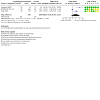
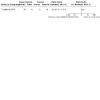
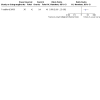


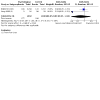








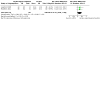
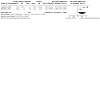
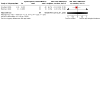
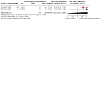







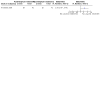












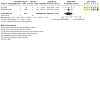
































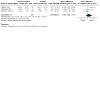









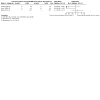









Update of
-
Psychological and pharmacological interventions for depression in patients with coronary artery disease.Cochrane Database Syst Rev. 2011 Sep 7;2011(9):CD008012. doi: 10.1002/14651858.CD008012.pub3. Cochrane Database Syst Rev. 2011. Update in: Cochrane Database Syst Rev. 2021 Dec 15;12:CD008012. doi: 10.1002/14651858.CD008012.pub4. PMID: 21901717 Free PMC article. Updated.
References
References to studies included in this review
Abbasi 2015 {published data only}
-
- Abbasi SH, Mohammadinejad P, Shahmansouri N, Salehiomran A, Beglar AA, Zeinoddini A, et al. Simvastatin versus atorvastatin for improving mild to moderate depression in post-coronary artery bypass graft patients: a double-blind, placebo-controlled, randomized trial. Journal of Affective Disorders 2015;183:149-55. - PubMed
ANDROS 2015 {published data only (unpublished sought but not used)}
-
- NCT02463110. Acute myocardial necrosis and depression: antiplatelet effect of reuptake inhibition of serotonin. clinicaltrials.gov/show/nct02463110 (first posted 4 June 2015).
Barth 2005 {published and unpublished data}
Brown 1993 {published data only (unpublished sought but not used)}
-
- Brown MA, Munford AM, Munford PR. Behavior therapy of psychological distress in patients after myocardial infarction or coronary bypass. Journal of Cardiopulmonary Rehabilitation and Prevention 1993;13:201-10.
Carney 2009 {published data only}
CREATE 2007 {published data only}
-
- Frasure-Smith N, Koszycki D, Swenson JR, Baker B, Zyl L. Design and rationale for a randomized, controlled trial of interpersonal psychotherapy and citalopram for depression in coronary artery disease (CREATE): erratum. Psychosomatic Medicine 2007;69(2):216. - PubMed
-
- Frasure-Smith N, Koszycki D, Swenson JR, Baker B, Zyl LT, Laliberté MA, et al. Design and rationale for a randomized, controlled trial of interpersonal psychotherapy and citalopram for depression in coronary artery disease (CREATE). Psychosomatic Medicine 2006;68:87-93. - PubMed
-
- Lespérance F, Frasure-Smith N, Koszycki D, Laliberté MA, Zyl LT, Baker B, et al. Effects of citalopram and interpersonal psychotherapy on depression in patients with coronary artery disease: the Canadian cardiac randomized evaluation of antidepressant and psychotherapy efficacy (CREATE) trial. JAMA 2007;29:367-79. - PubMed
-
- Zyl LT, Lesperance F, Frasure-Smith N, Malinin AI, Atar D, Laliberte MA, et al. Platelet and endothelial activity in comorbid major depression and coronary artery disease patients treated with citalopram: the Canadian cardiac randomized evaluation of antidepressant and psychotherapy efficacy trial (CREATE) biomarker sub-study. Journal of Thrombosis and Thrombolysis 2009;27(1):48-56. - PubMed
Dao 2011 {published data only}
-
- Dao TK, Youssef NA, Armsworth M, Wear E, Papathopoulos KN, Gopaldas R. Randomized controlled trial of brief cognitive behavioral intervention for depression and anxiety symptoms preoperatively inpatients undergoing coronary artery bypass graft surgery. Journal of Thoracic and Cardiovascular Surgery 2011;142:109-15. - PubMed
Divsalar 2018 {published data only}
-
- Divsalar P, Noorbala AA, Zadeh EM, Jafarinia M, Shakiba M, Shahmansouri N, et al. Red yeast rice as an adjunct to sertraline for treatment of depression in patients with percutaneous coronary intervention: placebo-controlled trial. Advances in Integrative Medicine 2018;5(2):69-74. [DOI: 10.1016/j.aimed.2018.01.001] - DOI
Doering 2007 {published data only (unpublished sought but not used)}
-
- Doering LV, Cross R, Vredevoe D, Martinez-Maza O, Cowan MJ. Infection, depression, and immunity in women after coronary artery bypass: a pilot study of cognitive behavioral therapy. Alternative Therapies in Health and Medicine 2007;13:18-21. - PubMed
ENRICHD 2003 {published data only (unpublished sought but not used)}
-
- Berkman LF, Blumenthal J, Burg M, Carney RM, Catellier D, Cowan MJ, et al. Effects of treating depression and low perceived social support on clinical events after myocardial infarction: the enhancing recovery in coronary heart disease patients (ENRICHD) randomized trial. JAMA 2003;289:3106-16. - PubMed
-
- ENRICHD Investigators. Enhancing recovery in coronary heart disease (ENRICHD): baseline characteristics. American Journal of Cardiology 2001;88(3):316-22. - PubMed
-
- ENRICHD Investigators. Enhancing recovery in coronary heart disease (ENRICHD) study intervention: rationale and design. Psychosomatic Medicine 2001;63(5):747-55. - PubMed
-
- ENRICHD Investigators. Enhancing recovery in coronary heart disease patients (ENRICHD): study design and methods. American Heart Journal 2000;139:1-9. - PubMed
-
- Mendes de Leon CF, Czajkowski SM, Freedland KE, Bang H, Powell LH, Wu C, et al. The effect of a psychosocial intervention and quality of life after acute myocardial infarction: the enhancing recovery in coronary heart disease (ENRICHD) clinical trial. Journal of Cardiopulmonary Rehabilitation and Prevention 2006;26:9-13. - PubMed
EsDEPACS 2014 {published data only}
-
- Kim JM, Stewart R, Bae KY, Kang HJ, Kim SW, Shin IS, et al. Effects of depression co-morbidity and treatment on quality of life in patients with acute coronary syndrome: the Korean depression in ACS (K-DEPACS) and the escitalopram for depression in ACS (EsDEPACS) study. Psychological Medicine 2015;45:1641-52. [DOI: 10.1017/S003329171400275X] - DOI - PubMed
Fang 2003 {published data only}
-
- Fang R, Jiang Y, Song J, Cheng G, Xue G. Control study of general psychological intervention for patients with myocardial infarction. Chinese Journal of Clinical Rehabilitation 2003;7:1382-3.
Freedland 2009 {published data only}
-
- Freedland KE. Treatment of depression after coronary bypass surgery. www.controlled-trials.com/mrct/trial/438737 (accessed 14 December 2009).
Freeman 1986 {published data only (unpublished sought but not used)}
-
- Freeman AM, Fleece L, Folks DG, Sokol RS, Hall KR, Pacifico AD, et al. Alprazolam treatment of postcoronary bypass anxiety and depression. Journal of Clinical Psychopharmacology 1986;6:39-41. - PubMed
Kennedy 2005 {unpublished data only}
-
- EUCTR2004-000990-78-AT. A double-blind, multicentre, randomised, parallel-group, placebo-controlled study assessing the efficacy and safety of escitalopram in post-myocardial infarction patients suffering from depressive symptoms. www.who.int/trialsearch/trial2.aspx?Trialid=euctr2004-000990-78-at (date of registration 23 September 2004).
Li 2005 {published data only}
-
- Li YM, Li GY, Wang XL, Yu LF. Rehabilitation effect of St John's wort extract on depression and myocardial function after coronary artery bypass grafting: a randomized grouping, placebo-control and blind evaluation. Zhongguo Linchuang Kangfu 2005;9:38-9.
Liu 1999 {published data only}
-
- Liu JD, Zheng H. Efficacy of fluoxetine in the treatment of depression in patients with acute myocardial infarction. Journal of Clinical Psychological Medicine 1999;9:210-1.
Liu 2016 {published data only}
-
- Liu W, Qin J. Clinical efficacy and safety of the ShuganJieyu capsule in patients with acute myocardial infarction and depression. International Journal of Psychiatry in Medicine 2016;51:534-43. - PubMed
Ma 2019 {published data only}
-
- Ma H, Wang Y, Xue Y, Huang D, Kong Y, Zhao X, et al. The effect of Xinkeshu tablets on depression and anxiety symptoms in patients with coronary artery disease: results from a double-blind, randomized, placebo-controlled study. Biomedicine and Pharmacotherapy 2019;112:108639. [DOI: 10.1016/j.biopha.2019.108639] - DOI - PubMed
McFarlane 2001 {published data only (unpublished sought but not used)}
-
- McFarlane A, Kamath MV, Fallen EL, Malcolm V, Cherian F, Norman G. Effect of sertraline on the recovery rate of cardiac autonomic function in depressed patients after acute myocardial infarction. American Heart Journal 2001;142(4):617-23. - PubMed
McLaughlin 2005 {published data only (unpublished sought but not used)}
-
- Bambauer KZ, Aupont O, Stone PH, Locke SE, Mullan MG, Colagiovanni J, et al. The effect of a telephone counseling intervention on self-rated health of cardiac patients. Psychosomatic Medicine 2005;67:539-45. - PubMed
MIND‐IT 2007 {published data only (unpublished sought but not used)}
-
- Honig A, Kuyper AM, Schene AH, Melle JP, Jonge P, Tulner DM, et al. Treatment of post-myocardial infarction depressive disorder: a randomized, placebo-controlled trial with mirtazapine. Psychosomatic Medicine 2007;69:606-13. - PubMed
-
- Schins A, Hamuly KK, Scharp S, Lousberg R, Van Melle J, Crijns H, et al. Whole blood serotonin and platelet activation in depressed post-myocardial infarction patients. Life Sciences 2004;76(6):637-50. - PubMed
-
- Van den Brink RH, Melle JP, Honig A, Schene AH, Crijns HJ, Lambert FP, et al. Treatment of depression after myocardial infarction and the effects on cardiac prognosis and quality of life: rationale and outline of the Myocardial INfarction and Depression-Intervention Trial (MIND-IT). American Heart Journal 2002;144:219-25. - PubMed
-
- Van Melle JP, Jonge P, Honig A, Schene AH, Kuyper AM, Crijns HJ, et al. Effects of antidepressant treatment following myocardial infarction. British Journal of Psychiatry 2007;190:460-6. - PubMed
-
- Zuidersma M, Conradi HJ, Melle JP, Ormel J, Jonge P. Depression treatment after myocardial infarction and long-term risk of subsequent cardiovascular events and mortality: a randomized controlled trial. Journal of Psychosomatic Research 2013;74:25-30. - PubMed
MoodCare 2011 {published data only}
-
- O'Neil A, Taylor B, Hare DL, Sanderson K, Cyril S, Venugopal K, et al. Long-term efficacy of a tele-health intervention for acute coronary syndrome patients with depression: 12-month results of the MoodCare randomized controlled trial. Preventive Cardiology 2015;22:1111-20. - PubMed
-
- O'Neil A, Taylor B, Sanderson K, Cyril S, Chan B, Hawkes AL, et al. Efficacy and feasibility of a tele-health intervention for acute coronary syndrome patients with depression: results of the “MoodCare” randomized controlled trial. Annals of Behavioral Medicine 2014;48:163-74. - PubMed
Pizzi 2009 {published data only}
-
- Pizzi C, Mancini S, Angeloni L, Fontana F, Costa GM. CORRIGENDUM: Effects of selective serotonin reuptake inhibitor therapy on endothelial function and inflammatory markers in patients with coronary heart disease. Clinical Pharmacology & Therapeutics 2009;86:683. - PubMed
-
- Pizzi C, Mancini S, Angeloni L, Fontana F, Costa GM. Sertraline ameliorates endothelial dysfunction and inflammation in coronary heart disease patients with depression. European Heart Journal 2009;30(Suppl 1):520.
-
- Pizzi C, Mancini S, Angeloni L, Fontana F, Manzoli L, Costa GM. Effects of selective serotonin reuptake inhibitor therapy on endothelial function and inflammatory markers in patients with coronary heart disease. Clinical Pharmacology and Therapeutics 2009;86:527-32. - PubMed
Roose 1998 {published data only (unpublished sought but not used)}
-
- Nelson JC, Kennedy JS, Pollock BG, Laghrissi-Thode F, Narayan M, Nobler MS, et al. Treatment of major depression with nortriptyline and paroxetine in patients with ischemic heart disease. American Journal of Psychiatry 1999;156:1024-8. - PubMed
-
- Pollock BG, Laghrissi-Thode F, Wagner WR. Evaluation of platelet activation in depressed patients with ischemic heart disease after paroxetine or nortriptyline treatment. Journal of Clinical Psychopharmacology 2000;20(2):137-40. - PubMed
-
- Roose S, Pollock B, Kennedy J, Nelson J, Gergel I, McCafferty J. Paroxetine in the treatment of depressed patients with ischaemic heart disease. In: Sixth World Congress of Biological Psychiatry, Nice, France. June 22 27. 1997.
-
- Roose S, Pollock B, Kennedy J, Nelson J, McCafferty J, Gergel I. Paroxetine versus nortriptyline in ischemic disease. In: 150th Annual Meeting of the American Psychiatric Association San Diego, California, USA 17 22 May. 1997.
-
- Roose SP, Laghrissi-Thode F, Kennedy JS, Nelson JC, Bigger JT, Pollock BG, et al. Comparison of paroxetine and nortriptyline in depressed patients with ischemic heart disease. JAMA 1998;279:287-91. - PubMed
SADHART 2002 {published data only (unpublished sought but not used)}
-
- Glassman AH, Bigger T Jr, Gaffney M. Psychiatric characteristics associated with long-term mortality among 361 patients having an acute coronary syndrome and major depression. Archives of General Psychiatry 2009;66:1022-9. - PubMed
-
- Glassman AH, O'Connor CM, Califf RM, Swedberg K, Schwartz P, Bigger JT Jr, et al. Sertraline treatment of major depression in patients with acute MI or unstable angina: ERRATUM. JAMA 2002;288(14):1720. - PubMed
-
- Glassman AH, O'Connor CM, Califf RM, Swedberg K, Schwartz P, Bigger JT Jr, et al. Sertraline treatment of major depression in patients with acute MI or unstable angina. JAMA 2002;288:701-9. - PubMed
-
- Lattanzio F, Cherubini A, Furneri G, Di Bari M, Marchionni N. Sertraline treatment for depression associated with acute coronary syndromes: a cost analysis from the viewpoint of the Italian healthcare system. Aging: Clinical and Experimental Research 2008;20(1):76-80. - PubMed
-
- O'Connor CM, Glassman AH, Harrison DJ. Pharmacoeconomic analysis of sertraline treatment of depression in patients with unstable angina or a recent myocardial infarction. Journal of Clinical Psychiatry 2005;66:346-52. - PubMed
Shahmansouri 2014 {published data only}
-
- Shahmansouri S, Farokhnia M, Abbasi SH, Kassaian SE, Tafti AA, Gougol A, et al. A randomized, double-blind, clinical trial comparing the efficacy and safety of Crocus sativus L. with fluoxetine for improving mild to moderate depression in post percutaneous coronary intervention patient. Journal of Affective Disorders 2013;155:216-22. - PubMed
SPIRR‐CAD 2011 {published data only}
-
- Albus C, Beutel ME, Deter H-C, Fritzsche K, Hellmich M, Jordan H, et al. A stepwise psychotherapy intervention for reducing risk in coronary artery disease (SPIRR-CAD) - rationale and design of a multicenter, randomized trial in depressed patients with CAD. Journal of Psychosomatic Research 2011;71:215-22. - PubMed
-
- Fangauf SV, Herbeck Belnap B, Meyer T, Albus C, Binder L, Deter H-C, et al. Associations of NT-proBNP and parameters of mental health in depressed coronary artery disease patients. Psychoneuroendocrinology 2018;96:188-94. - PubMed
-
- Fritzsche K, Albus C, Jordan J, Beutel ME, Wiltink J, Herrmann-Lingen C. Individual and couple intervention for depressive coronary heart patients. Therapy manual, quality assurance and first experiences within the framework of a randomized controlled trial [Einzel- und Paarintervention für depressive Koronarpatienten. Therapiemanual, Qualitätssicherung und erste Erfahrungen im Rahmen einer randomisierten kontrollierten Interventionsstudie]. Psychotherapeut 2011;56:325-36.
-
- Herrmann-Lingen C, Beutel ME, Bosbach A, Deter H-C, Fritzsche K, Hellmich M, et al. A stepwise psychotherapy intervention for reducing risk in coronary artery disease (SPIRR-CAD): results of an observer-blinded, multicenter, randomized trial in depressed patients with coronary artery disease. Psychosomatic Medicine 2016;78:704-15. - PubMed
-
- ISRCTN76240576. A stepwise psychotherapy intervention for reducing risk in coronary artery disease - a randomised controlled trial (SPIRR-CAD). doi.org/10.1186/ISRCTN76240576 (date assigned 27 March 2008).
Strik 2000 {published data only (unpublished sought but not used)}
-
- Strik JJ, Honig A, Klinkenberg E, Dijkstra J, Jolles J. Cognitive performance following fluoxetine treatment in depressed patients post myocardial infarction. Acta Neuropsychiatrica 2006;18(1):1-6. - PubMed
-
- Strik JJ, Honig A, Lousberg R, Lousberg AH, Cheriex EC, Tuynman-Qua HG, et al. Efficacy and safety of fluoxetine in the treatment of patients with major depression after first myocardial infarction: findings from a double-blind, placebo-controlled trial. Psychosomatic Medicine 2000;62:783-9. - PubMed
-
- Strik JJ, Praag HM, Honig A. Depression after first myocardial infarction. A prospective study on incidence, prognosis, risk factors and treatment. Tijdschrift Voor Gerontologie en Geriatrie 2003;34(3):104-12. - PubMed
Tian 2016 {published data only}
TREATED‐ACS 2020 {published data only (unpublished sought but not used)}
-
- Rafanelli C, Gostoli S, Buzzichelli S, Bergerone S, Gaita F, Roncuzzi R, et al. Results of the TREATED-ACS: a randomized controlled trial on the effectiveness of Cognitive Behavioral Therapy, combined with Well-Being Therapy, in improving depression and reducing cardiac risk among patients with acute coronary syndrome. Psychotherapy and Psychosomatics 2019;88(Suppl 1):106-7.
-
- Rafanelli C, Gostoli S, Buzzichelli S, Guidi J, Sirri L, Gallo P, et al. Sequential combination of cognitive-behavioral treatment and well-being therapy in depressed patients with acute coronary syndromes: a randomized controlled trial (TREATED-ACS Study). Psychotherapy and Psychosomatics 2020;89(6):345-56. - PubMed
U‐CARE 2018 {published data only}
-
- Humphries SM, Wallert J, Norlund F, Held C, Olsson E. 12-month follow-up of the U-CARE heart trial: using internet-based cognitive behavioural therapy to treat patients experiencing depression and anxiety after myocardial infarction. In: 25th World Congress of the International College of Psychosomatic Medicine, ICPM 2019 Italy , editors(s). Psychotherapy and Psychosomatics. Vol. 88. 2019.
-
- Humphries SM, Wallert J, Norlund F, Wallin E, Burell G, Essen L, et al. Internet-based cognitive behavioral therapy for patients reporting symptoms of anxiety and depression after myocardial infarction: U-CARE Heart randomized controlled trial twelve-month follow-up. Journal of Medical Internet Research 2021;23:e25465. - PMC - PubMed
-
- Norlund F, Olsson EM, Burell G, Wallin E, Held C. Treatment of depression and anxiety with internet-based cognitive behavior therapy in patients with a recent myocardial infarction (U-CARE Heart): study protocol for a randomized controlled trial. Trials 2015;16:154. [DOI: 10.1186/s13063-015-0689-y] - DOI - PMC - PubMed
-
- Norlund F, Wallin E, Olsson EM, Wallert J, Burell G, Essen L, et al. Internet-based cognitive behavioral therapy for symptoms of depression and anxiety among patients with a recent myocardial infarction: the U-CARE Heart randomized controlled trial. European Journal of Preventive Cardiology 2018;25(2 Suppl 1):S63-4. [DOI: 10.1177/2047487318786178] - DOI - PMC - PubMed
-
- Norlund F, Wallin E, Olsson EM, Wallert J, Burell G, Essen L, et al. Internet-based cognitive behavioral therapy for symptoms of depression and anxiety among patients with a recent myocardial infarction: the U-CARE heart randomized controlled trial. Journal of Medical Internet Research 2018;20(3):e88. [DOI: 10.2196/jmir.9710] - DOI - PMC - PubMed
UPBEAT 2012 {published data only}
-
- Blumenthal JA, Sherwood A, Babyak MA, Watkins LL, Smith PJ, Hoffman BM, et al. Exercise and pharmacological treatment of depressive symptoms in patients with coronary heart disease: results from the UPBEAT (Understanding the Prognostic Benefits of Exercise and Antidepressant Therapy) study. Journal of the American College of Cardiology 2012;60:1053-63. - PMC - PubMed
-
- Blumenthal JA, Sherwood A, Rogers SD, Babyak MA, Doraiswamy PM, Watkins L, et al. Understanding prognostic benefits of exercise and antidepressant therapy for persons with depression and heart disease: the UPBEAT study - rationale, design, and methodological issues. Clinical Trials 2007;4:548-59. - PMC - PubMed
Wang 2020 {published data only}
-
- Wang Y, Liu YJ, Li F-E, Guo Z, Wang J, Comorbid Depression and Coronary Heart Disease Research Group of Cangzhou Central Hospital. A Chinese herbal formula shows beneficial effects on comorbid depression and coronary heart disease based on the philosophy of psycho-cardiology. Journal of Herbal Medicine 2020;19:100303. [CHICTR-INC: 17012872]
WIDeCAD 2017 {published data only (unpublished sought but not used)}
-
- Bendig E, Bauereiss N, Buntrock C, Habibovic M, Ebert DD, Baumeister H. Lessons learned from an attempted randomized-controlled feasibility trial on “WIDeCAD” - an internet-based depression treatment for people living with coronary artery disease (CAD). Internet Interventions 2021;24:100375. - PMC - PubMed
Yang 2019 {published data only}
-
- Yang L, Wang X, Cui X. Patients' intensive telephone-based care program reduces depression in coronary artery disease patients and may contribute to favorable overall survival by decreasing depression. Journal of Cardiovascular Nursing 2019;34:236-43. - PubMed
Zarea 2014 {published data only}
References to studies excluded from this review
Abedimanesh 2017 {published data only}
-
- Abedimanesh N, Ostadrahimi A, Bathaie SZ, Abedimanesh S, Motlagh B, Jafarabadi MA, et al. Effects of saffron aqueous extract and its main constituent, crocin, on health-related quality of life, depression, and sexual desire in coronary artery disease patients: a double-blind, placebo-controlled, randomized clinical trial. Iranian Red Crescent Medical Journal 2017;19:e13676.
ACHD‐CARE 2015 {published data only}
-
- Kovacs AH, Bandyopadhyay M, Grace SL, Kentner AC, Nolan RP, Silversides CK, et al. Adult congenital heart disease-coping and resilience (ACHD-CARE): rationale and methodology of a pilot randomized controlled trial. Contemporary Clinical Trials 2015;45:385-93. - PubMed
-
- Kovacs AH, Grace SL, Kentner AC, Nolan RP, Silversides CK, Irvine MJ. Feasibility and outcomes in a pilot randomized controlled trial of a psychosocial intervention for adults with congenital heart disease. Canadian Journal of Cardiology 2018;34:766-73. - PubMed
ACTonHEART 2014 {published data only}
-
- Spatola CA, Manzoni GM, Castelnuovo G, Malfatto G, Facchini M, Goodwin CL, et al. The ACTonHEART study: rationale and design of a randomized controlled clinical trial comparing a brief intervention based on Acceptance and Commitment Therapy to usual secondary prevention care of coronary heart disease. Health and Quality of Life Outcomes 2014;12:22. - PMC - PubMed
Beating Heart Problems 2014 {published data only}
-
- Turner A, Murphy BM, Higgins RO, Elliott PC, Le Grande MR, Goble AJ, et al. An integrated secondary prevention group programme reduces depression in cardiac patients. European Journal of Preventive Cardiology 2014;21:153-62. - PubMed
Black 1998 {published data only}
-
- Black JL, Allison TG, Williams DE, Rummans TA, Gau GT. Effect of intervention for psychological distress on rehospitalization rates in cardiac rehabilitation patients. Psychosomatics 1998;39:134-43. - PubMed
Boese 2013 {published data only}
-
- Boese A, Bock S, Kielblock B, Siegmund-Schultze E, Kröner-Herwig B, Herrmann-Lingen C. Randomised controlled trial of a telephone-based peer support intervention to reduce depressive symptoms and improve social support in women with CHD. Journal of Psychosomatic Research 2013;74:539-62.
BraveHeart 2013 {published data only}
-
- Hambridge JA, Turner A, Baker AL. BraveHeart begins: pilot results of group cognitive behaviour therapy for depression and anxiety in cardiac patients. Australian and New Zealand Journal of Psychiatry 2009;43:1171–7. - PubMed
-
- Turner A, Hambridge J, Baker A, Bowman J, McElduff P. Randomised controlled trial of group cognitive behaviour therapy versus brief intervention for depression in cardiac patients. Australian and New Zealand Journal of Psychiatry 2013;47:235-43. - PubMed
Bucknall 1988 {published data only}
-
- Bucknall C, Brooks D, Curry PVL, Bridges PK, Bouras N, Ankier SI. Mianserin and trazodone for cardiac patients with depression. European Journal of Clinical Pharmacology 1988;33:565-9. - PubMed
BY.PASS Study 2013 {published data only}
-
- Rosendahl J, Tigges-Limmer K, Gummert J, Dziewas R, Albes JM, Strauss B. Bypass surgery with psychological and spiritual support (the BY.PASS Study): results of a pragmatic trial based on patients' preference. Psychotherapy and Psychosomatics 2013;82:35-44. - PubMed
CADENCE 2016 {published data only}
-
- Richards SH, Campbell JL, Dickens C, Anderson R, Gandhi M, Gibson A, et al. A feasibility study and pilot RCT to establish methods for assessing the acceptability, and clinical effectiveness and cost effectiveness of enhanced psychological care in cardiac rehabilitation services for patients with new onset depression compared with treatment as usual: the CADENCE Study. Health Technology Assessments 2017;22:1-220. - PMC - PubMed
-
- Richards SH, Campbell JL, Dickens C, Anderson R, Gandhi M, Gibson A, et al. Enhanced psychological care in cardiac rehabilitation services for patients with new-onset depression: the CADENCE feasibility study and pilot RCT. Health Technology Assessment 2018;22(30):1-220. [DOI: 10.3310/hta22300] - DOI - PMC - PubMed
-
- Richards SH, Dickens C, Anderson R, Richards DA, Taylor RS, Ukoumunne OC, et al. Assessing the effectiveness of Enhanced Psychological Care for patients with depressive symptoms attending cardiac rehabilitation compared with treatment as usual (CADENCE): a pilot cluster randomised controlled trial. Trials 2018;19(1):211. [DOI: 10.1186/s13063-018-2576-9] - DOI - PMC - PubMed
-
- Richards SH, Dickens C, Anderson R, Richards DA, Taylor RS, Ukoumunne OC, et al. Assessing the effectiveness of enhanced psychological care for patients with depressive symptoms attending cardiac rehabilitation compared with treatment as usual (CADENCE) : study protocol for a pilot cluster randomised controlled trial. Trials 2016;17(1):59. [DOI: 10.1186/s13063-016-1184-9] - DOI - PMC - PubMed
Carney 2012 {published data only}
Carney 2019 {published data only}
CHAMPS 2016 {published data only}
Chang 2020 {published data only}
-
- Chang Z, Guo A, Zhou A, Sun TW, Ma LL, Gardiner FW, et al. Nurse-led psychological intervention reduces anxiety symptoms and improves quality of life following percutaneous coronary intervention for stable coronary artery disease. Australian Journal of Rural Health 2020;28:124-31. - PubMed
Child 2010 {published data only}
-
- Child A, Sanders J, Sigel P, Hunter MS. Meeting the psychological needs of cardiac patients: an integrated stepped-care approach within a cardiac rehabilitation setting. British Journal of Cardiology 2010;17:175-9.
CHIP 2011 {published data only}
-
- Thieszen CL, Merrill RM, Aldana SG, Diehl HA, Mahoney ML, Greenlaw RL, et al. The coronary health improvement project (CHIP) for lowering weight and improving psychosocial health. Psychological Reports 2011;109:338-52. - PubMed
Chung 2010 {published data only}
-
- Chung LJ, Tsai PS, Liu BY, Chou KR, Lin WH, Shyu YK, et al. Home-based deep breathing for depression in patients with coronary heart disease: a randomised controlled trial. International Journal of Nursing Studies 2010;47:1346-53. - PubMed
CODIACS 2013 {published data only}
COINCIDE 2012 {published data only}
-
- Coventry PA, Lovell K, Dickens C, Bower P, Chew-Graham C, Cherrington A, et al. Collaborative Interventions for Circulation and Depression (COINCIDE): study protocol for a cluster randomized controlled trial of collaborative care for depression in people with diabetes and/or coronary heart disease. Trials 2012;13:139. - PMC - PubMed
-
- Coventry PA, Lovell K, Dickens C, Bower P, Chew-Graham C, Cherrington A, et al. Update on the collaborative interventions for circulation and depression (COINCIDE) trial: changes to planned methodology of a cluster randomized controlled trial of collaborative care for depression in people with diabetes and/or coronary heart disease. Trials 2013;14:136. - PMC - PubMed
COPES 2010 {published data only}
Doering 2013 {published data only}
ENHANCED 2016 {published data only}
Fu 2006 {published data only}
-
- Fu YX, Meng HQ, Luo QH. Interventional effect of fluoxetine on patients with acute myocardial infarction accompanied by anxiety and depression. Chinese Journal of Clinical Rehabilitation 2006;10:16-7.
Giltay 2011 {published data only}
González‐Jaimes 2003 {published data only}
-
- Gonzalez-Jaimes EI, Turnbull-Plaza B. Selection of psychotherapeutic treatment for adjustment disorder with depressive mood due to acute myocardial infarction. Archives of Medical Research 2003;34:298-304. - PubMed
Haberka 2013 {published data only}
-
- Haberka M, Mizia-Stec K, Mizia M, Gieszczyk K, Chmiel A, Sitnik-Warchulska K, et al. Effects of n-3 polyunsaturated fatty acids on depressive symptoms, anxiety and emotional state in patients with acute myocardial infarction. Pharmacological Reports 2013;65:59-68. - PubMed
Haybar 2018 {published data only}
-
- Haybar H, Javid AZ, Haghighizadeh MH, Valizadeh E, Mohaghegh SM, Mohammadzadeh A. The effects of Melissa officinalis supplementation on depression, anxiety, stress, and sleep disorder in patients with chronic stable angina. Clinical Nutrition ESPEN 2018;26:47-52. - PubMed
Huffman 2011 {published data only}
-
- Huffman JC, Mastromauro CA, Sowden GL, Wittmann C, Rodman R, Januzzi JL. A collaborative care depression management program for cardiac inpatients: depression characteristics and in-hospital outcomes. Psychosomatics 2011;52:26-33. - PubMed
I‐CARE 2018 {published data only}
-
- Li S, Blumenthal JA, Shi C, Millican D, Li X, Du X, et al. I-CARE randomized clinical trial integrating depression and acute coronary syndrome care in low-resource hospitals in China: design and rationale. American Heart Journal 2018;202:109-15. [NCT: 02195193] - PubMed
InterHerz 2012 {published data only (unpublished sought but not used)}
Jang 2018 {published data only}
Kachkovskii 2006 {published data only}
-
- Kachkovskii MA, Kriukov NN. Treatment of depression in patients with myocardial infarction with tianeptine. Kardiologiia 2006;46:21-6. - PubMed
Keeping‐Burke 2013 {published data only}
-
- Keeping-Burke L, Purden M, Frasure-Smith N, Cossette S, McCarthy F, Amsel R. Bridging the transition from hospital to home: effects of the VITAL telehealth program on recovery for CABG surgery patients and their caregivers. Research in Nursing & Health 2013;36:540-53. - PubMed
Li 2014 {published data only}
Li 2020 {published data only}
Liang 2019 {published data only}
-
- Liang H, Liu L, Hu H. The effects of mindfulness-based stress reduction on the mental states, sleep quality, and medication compliance of patients with acute myocardial infarction after percutaneous coronary intervention. International Journal of Clinical and Experimental Medicine 2019;12:13514-23.
Lin 2014 {published data only}
Lv 2016 {published data only}
-
- Lv J, Zhang X, Ou S, Gu S, Su Z, Tong S, et al. Influence of cognitive behavioral therapy on mood and quality of life after stent implantation in young and middle-aged patients with coronary heart disease. International Heart Journal 2016;57:167-72. - PubMed
Ma 2010 {published data only}
-
- Ma W, Hu D, Liu G, Jiang J, Deng B, Liu R, et al. Effect of patient-specific intervention of depression on quality of life after acute coronary syndrome. Circulation 2010;122:251.
Malik 2002 {published data only}
-
- Malik NA. Comparison of treatment to influence depression as a risk factor for ischemic heart disease with new generation antidepressants. In: XII World Congress of Psychiatry, Yokohama, Japan. Aug 24 9, 2002.
Mazereeuw 2016 {published data only}
-
- Mazereeuw G, Herrmann N, Oh PI, Ma DW, Wang CT, Kiss A, et al. Omega-3 fatty acids, depressive symptoms, and cognitive performance in patients with coronary artery disease: analyses from a randomized, double-blind, placebo-controlled trial. Journal of Clinical Psychopharmacology 2016;36(5):436-44. [CLINICALTRIALS.GOV ID: NCT00981383] - PMC - PubMed
MindfulHeart 2014 {published data only}
-
- Nyklíček I, Dijksman S, Lenders P, Fonteijn W, Koolen J. A brief mindfulness based intervention for increase in emotional well-being and quality of life in percutaneous coronary intervention (PCI) patients: the MindfulHeart randomized controlled trial. Journal of Behavioral Medicine 2014;37:135-44. [DOI: 10.1007/s10865-012-9475-4] - DOI - PubMed
Mohapatra 2005 {published data only}
MOSAIC 2013 {published data only}
-
- Huffman JC, Beach SR, Suarez L, Mastromauro CA, DuBois CM, Celano CM, et al. Design and baseline data from the Management of Sadness and Anxiety in Cardiology (MOSAIC) randomized controlled trial. Contemporary Clinical Trials 2013;36:488-501. - PubMed
MOTIV‐CABG 2013 {published data only}
-
- Chocron S, Vandel P, Durst C, Laluc F, Kaili D, Chocron M, et al. Antidepressant therapy in patients undergoing coronary artery bypass grafting: the MOTIV-CABG trial. Annals of Thoracic Surgery 2013;95:1609-18. - PubMed
Nikrahan 2019 {published data only}
-
- Nikrahan GR, Eshaghi L, Massey CN, Hemmat A, Amonoo HL, Healy B, et al. Randomized controlled trial of a well-being intervention in cardiac patients. General Hospital Psychiatry 2019;61:116-24. - PubMed
Norris 2009 {published data only}
-
- Norris CE, Patterson L, Galbraith D, Hegadoren KM. All you have to do is call; a pilot study to improve the outcomes of patients with coronary artery disease. Applied Nursing Research 2009;22:133-7. - PubMed
Oldridge 1991 {published data only}
-
- Oldridge N, Guyatt G, Jones N, Crowe J, Singer J, Feeny D, et al. Effects on quality of life with comprehensive rehabilitation after acute myocardial infarction. American Journal of Cardiology 1991;67:1084-9. - PubMed
-
- Oldridge N, Streiner D, Hoffmann R, Guyatt G. Profile of mood states and cardiac rehabilitation after acute myocardial infarction. Medicine and Science in Sports and Exercise 1995;27:900-5. - PubMed
Oranta 2010 {published data only}
-
- Oranta O, Luutonen S, Salokangas RK, Vahlberg T, Leino-Kilpi H. Depression-focused interpersonal counseling and the use of healthcare services after myocardial infarction. Perspectives in Psychiatric Care 2012;48:47-55. - PubMed
-
- Oranta O, Luutonen S, Salokangas RK, Vahlberg T, Leino-Kilpi H. The effects of interpersonal counselling on health-related quality of life after myocardial infarction. Journal of Clinical Nursing 2011;20:3373-82. - PubMed
-
- Oranta O, Luutonen S, Salokangas RK, Vahlberg T, Leino-Kilpi H. The outcomes of interpersonal counselling on depressive symptoms and distress after myocardial infarction. Nordic Journal of Psychiatry 2010;64:78-86. - PubMed
-
- Oranta O, Luutonen S, Salokangas RKR, Vahlberg T, Leino-Kilpi H. Nurse-led interpersonal counseling for depressive symptoms in patients with myocardial infarction. Cardiology (Switzerland) 2013;126:104.
O’Doherty 2015 {published data only}
-
- O’Doherty V, Carr A, McGrann A, O’Neill JO, Dinan S, Graham I, et al. A controlled evaluation of mindfulness-based cognitive therapy for patients with coronary heart disease and depression. Mindfulness 2014;6:405–16.
Park 2013 {published data only}
-
- Park JH, Tahk SJ, Bae SH, Son YJ. Effects of a psychoeducational intervention for secondary prevention in Korean patients with coronary artery disease: a pilot study. International Journal of Nursing Practice 2013;19:295-305. - PubMed
PATHWAY Group MCT {published data only}
-
- Wells A, McNicol K, Reeves D, Salmon P, Davies L, Heagerty A, et al. Improving the effectiveness of psychological interventions for depression and anxiety in the cardiac rehabilitation pathway using group-based metacognitive therapy (PATHWAY Group MCT): study protocol for a randomised controlled trial. Trials 2018;19(1):215. [DOI: 10.1186/s13063-018-2593-8] - DOI - PMC - PubMed
PATHWAY Home MCT {published data only}
-
- Wells A, McNicol K, Reeves D, Salmon P, Davies L, Heagerty A, et al. Metacognitive therapy home-based self-help for cardiac rehabilitation patients experiencing anxiety and depressive symptoms: study protocol for a feasibility randomised controlled trial (PATHWAY Home-MCT). Trials 2018;19(1):444. [CLINICALTRIALS.GOV:: NCT03129282] [DOI: 10.1186/s13063-018-2826-x] - DOI - PMC - PubMed
Pogosova 2004 {published data only}
-
- Pogosova GV, Zhidko NI, Krasnitsky VB, Tikhomirova EA, Odintsova AS, Akhmedjanov NM, et al. Clinical efficacy of tianeptine in patients with ischemic heart disease and comorbid depression. Kardiologiia 2004;44:20-4. - PubMed
Pogosova 2009 {published data only}
-
- Pogosova GV, Koltunov IE, Karpova AV, Eliseeva NA, Sapunova ID. Clinical efficacy of escitalopram in patients with ischemic heart disease and comorbid depression. Kardiologiia 2009;49:4-8. - PubMed
Rakowska 2015 {published data only}
-
- Rakowska JM. Brief strategic therapy in first myocardial infarction patients with increased levels of stress: a randomized clinical trial. Anxiety, Stress, & Coping 2015;28(6):687-705. - PubMed
Rollman 2009 {published data only}
Schneider 2020 {published data only}18912772
Schrader 2005 {published data only}
-
- Cheok F, Schrader G, Banham D, Marker J, Hordacre AL. Identification, course, and treatment of depression after admission for a cardiac condition: rationale and patient characteristics for the Identifying Depression As a Comorbid Condition (IDACC) project. American Heart Journal 2003;146:978-84. - PubMed
-
- Schrader G, Cheok F, Hordacre AL, Marker J, Wade V. Effect of psychiatry liaison with general practitioners on depression severity in recently hospitalised cardiac patients: a randomised controlled trial. Medical Journal of Australia 2005;182:272-6. - PubMed
-
- Wade V, Cheok F, Schrader G, Hordacre AL, Marker J. Depression after cardiac hospitalisation - the Identifying Depression as a Comorbid Condition (IDACC) study. Australian Family Physician 2005;34:985-9. - PubMed
Sogolitappeh 2009 {published and unpublished data}
-
- Sogolitappeh FN, Aliloo MM, Kheyroddin JB, Tabrizi MT. Effectiveness of group life skills training on decreasing anxiety and depression among heart patients, after bypass surgery. Iranian Journal of Psychiatry and Clinical Psychology 2009;15:50-6.
Soucy 2019 {published data only}
-
- Soucy I, Provencher MD, Fortier M, McFadden T. Secondary outcomes of the guided self-help behavioral activation and physical activity for depression trial. Journal of Mental Health 2019;28(4):410–8. - PubMed
STEP‐IN‐AMI‐2013 {published data only}
-
- Roncella A, Giornetti A, Cianfrocca C, Pasceri V, Pelliccia F, Denollet J, et al. Rationale and trial design of a randomized, controlled study on short-term psychotherapy after acute myocardial infarction: the STEP-IN-AMI trial (short term psychotherapy in acute myocardial infarction). Journal of Cardiovascular Medicine 2009;10:947-452. - PubMed
-
- Roncella A, Pristipino C, Cianfrocca C, Scorza S, Pasceri V, Pelliccia F, et al. One-year results of the randomized, controlled, short-term psychotherapy in acute myocardial infarction (STEP-IN-AMI) trial. International Journal of Cardiology 2013;170:132-9. - PubMed
Stern 1983 {published data only}
-
- Stern MJ, Gorman PA, Kaslow L. The group counseling v exercise therapy study. A controlled intervention with subjects following myocardial infarction. Archives of Internal Medicine 1983;143:1719-25. - PubMed
Strokova 2012 {published data only}
-
- Strokova EV, Naumova EA, Shvarts JG. Compliance to long-term treatment of cardiologic patients with mild to moderate depression: ineffectiveness of antidepressive therapy with pirlindol in randomized study. Rational Pharmacotherapy 2012;8:45-50.
SU.FOL.OM3 2012 {published data only}
-
- Andreeva VA, Galan P, Torrès M, Julia C, Hercberg S, Kesse-Guyot E. Supplementation with B vitamins or N-3 fatty acids and depressive symptoms in cardiovascular disease survivors: ancillary findings from the SUpplementation with FOLate, vitamins B-6 and B-12 and/or OMega-3 fatty acids (SU.FOL.OM3) randomized trial. American Journal of Clinical Nutrition 2012;96:208-14. - PubMed
SUPRIM 2011 {published data only}
-
- Gulliksson M, Burell G, Vessby B, Lundin L, Toss H, Svärdsudd K. Randomized controlled trial of cognitive behavioral therapy vs standard treatment to prevent recurrent cardiovascular events in patients with coronary heart disease: secondary prevention in Uppsala primary health care project (SUPRIM). Archives of Internal Medicine 2011;171:134-40. - PubMed
TAKE Heart 2010 {published data only}
-
- Eckert K, Schrader G, Wilkinson D, Askew D, Dick M, Wade T, et al. Detection and management of depression in patients with chronic heart disease: the Take Heart in Primary Care Cluster Randomised Controlled Trial. Heart, Lung and Circulation 2010;19:240-1.
TEAMcare 2010 {published data only}
Tsai 2012 {published data only}
-
- Tsai ST, Chou FH. The effectiveness of multimedia nursing education on reducing illness-related anxiety and uncertainty in myocardial infarction patients after percutaneous coronary intervention. Hu Li Za Zhi 2012;59:43-53. - PubMed
UPBEAT‐UK 2014 {published data only}
-
- Tylee A, Haddad M, Barley E, Ashworth M, Brown J, Chambers J, et al. A pilot randomised controlled trial of personalised care for depressed patients with symptomatic coronary heart disease in South London general practices: the UPBEAT-UK RCT protocol and recruitment. BMC Psychiatry 2012;12:58. - PMC - PubMed
Vasiuk 2010 {published data only}
-
- Vasiuk IuA, Lebedev AV, Dovzhenko TV, Semiglazova MV. Affective disorders in acute myocardial infarction and possibilities of their correction with tianeptin. Terapevticheskii Arkhiv 2010;82:28-33. - PubMed
Veith 1982 {published data only}
-
- Veith RC, Raskind MA, Caldwell JH, Barnes RF, Gumbrecht G, Ritchie JL. Cardiovascular effects of tricyclic antidepressants in depressed patients with chronic heart disease. New England Journal of Medicine 1982;306:954-9. - PubMed
WELL.ME 2012 {published data only}
-
- Compare A, Kouloulias V, Apostolos V, Peña WM, Molinari E, Grossi E, et al. Retraction Note: WELL.ME - Wellbeing therapy based on real-time personalized mobile architecture, vs. cognitive therapy, to reduce psychological distress and promote healthy lifestyle in cardiovascular disease patients: study protocol for a randomized controlled trial. Trials 2018;19:692. - PMC - PubMed
-
- Compare A, Kouloulias V, Apostolos V, Peña WM, Molinari E, Grossi E, et al. WELL.ME - Wellbeing therapy based on real-time personalized mobile architecture, vs. cognitive therapy, to reduce psychological distress and promote healthy lifestyle in cardiovascular disease patients: study protocol for a randomized controlled trial. Trials 2012;13:157. - PMC - PubMed
Zeng 2001 {published data only}
-
- Zeng W, Ma H, Liang Q, Dong Y, Ye H, Zhang Y. The influence of antidepressive therapy on short-term prognosis in elderly patients with unstable angina and depression. Zhonghua Nei Ke Za Zhi 2001;40:809-10. - PubMed
References to studies awaiting assessment
Ahangarezaiezadeh 2017 {published data only (unpublished sought but not used)}
-
- Ahangarezaiezadeh S, Oladrostam N, Nemotplahi A. The effect of positive thinking on stress, anxiety and depression in coronary heart disease. Nursing and Midwifery Journal 2017;15:339-48.
-
- IRCT2016022026347N2. The effect of positive thinking on stress, anxiety and depression in coronary patients. www.who.int/trialsearch/trial2.aspx?Trialid=irct2016022026347n2 (first received 13 July 2016).
Cai 2012 {published data only (unpublished sought but not used)}
-
- Cai JM, Xie DY. Clinical analysis on deanxit treating unstable angina patients with anxiety-depression. Heart 2012;98 Suppl 2:GW23-e1783.
CoroDep 2019 {published data only}
-
- NCT03841474. The changes in functional recovery and brain neurotrophic factor six months after percutaneous coronary intervention in cardiovascular patients with depression. clinicaltrials.gov/ct2/show/NCT03841474 (first received 15 February 2019). [NCT: 03841474]
Gu 2017 {published data only (unpublished sought but not used)}
-
- Gu Y, Zhu Y. Effects of mindfulness-based stress reduction on markers of cardiovascular risk in patients with ischemic heart disease a randomized controlled trial. Journal of the American College of Cardiology 2017;70(16):C166. [DOI: DOI: 10.1016/j.jacc.2017.07.592]
References to ongoing studies
Ahmadi 2018 {published data only (unpublished sought but not used)}
-
- IRCT20180312039056N2. Effectiveness of rumination-focused cognitive-behavioral therapy on improvement depression and anxiety in patients with coronary heart disease. trialsearch.who.int/Trial2.aspx?TrialID=IRCT20180312039056N2 (first received 14 October 2018).
Ardakani 2020 {published data only}IRCT20140126016374N2
-
- IRCT20140126016374N2. The study of of escitalopram's effectiveness on treatment of mild to moderate depressive disorder and improvement of quality of life in patients who are undergone coronary artery bypass graft surgery (CABG) – a randomized double blind placebo controlled trial. en.irct.ir/trial/49571?revision=159827 (first received 11 November 2020). [IRCT: 20140126016374N2]
COMBAT‐DS 2021 {published data only}
-
- NCT04986969. Online Cognitive Behavioral Therapy for Depressive Symptoms in Rural Patients With Cardiac Disease (COMBAT-DS). clinicaltrials.gov/ct2/show/NCT04986969 (first received 3 August 2021).
eMindYourHeart 2021 {published data only}
-
- Pedersen SS, Andersen CM, Ahm R, Skovbakke SJ, Kok R, Helmark C, et al. Efficacy and cost-effectiveness of a therapist-assisted web-based intervention for depression and anxiety in patients with ischemic heart disease attending cardiac rehabilitation (eMindYourHeart trial): a randomised controlled trial protocol. BMC Cardiovascular Disorders 2021;21:20. [HTTPS://CLINICALTRIALS.GOV/: NCT04172974] - PMC - PubMed
Firouzjaei 2017 {published data only (unpublished sought but not used)}
-
- IRCT2017080835568N1. The effectiveness of cognitive behavioral therapy on symptoms of depression, dysfunctional attitudes and level of social support in patients with cardiovascular disease. en.irct.ir/trial/26838 (first received 13 August 2017). [WHO CLINICAL TRIAL ID: IRCT2017080835568N1]
Geng 2018 {published data only (unpublished sought but not used)}
-
- ChiCTR1800014291. Effect of guanxin danshen dropping pill on clinical anxiety, depression, heart rate variability and cardiovascular prognosis in patients with coronary heart disease after PCI combined with anxiety or depression. trialsearch.who.int/Trial2.aspx?TrialID=ChiCTR1800014291 (first received 4 January 2018). [WHO CLINICAL TRIAL ID: chictr1800014291]
Hamzehpour 2020 {published data only}IRCT20190525043700N2
-
- Hamzehpour R. Comparison of bupropion and ecitalopram efficacy on depressive symptoms after coronary artery bypass graft surgery. en.irct.ir/trial/49626 (registration date 25 July 2020).
Irfan 2020 {published data only}
-
- NCT04347525. The effect of culturally adapted cognitive behaviour therapy (CaCBT)-based guided self help in depressed patients with myocardial infarction. A randomised controlled trial. clinicaltrials.gov/show/NCT04347525 (first received 15 April 2020).
Jazayeri 2017 {published data only}IRCT201702262394N36
-
- Jazayeri S. Effect of hesperidin supplementation on depressive symptoms, serum levels of BDNF and cortisol in patients after myocardial infarction. www.irct.ir/trial/2090 (registration date 26 April 2017). [IRCT: 201702262394N36]
Luberto 2021 {published data only}
-
- MBCT via group videoconferencing for acute coronary syndrome patients with depressive symptoms: a pilot RCT. Ongoing study. April 2021. Contact author for more information.
Ma 2014 {published data only (unpublished sought but not used)}
-
- Ma WL. The therapeutic effect of statins on patients with depression after acute coronary syndrome. trialsearch.who.int/Trial2.aspx?TrialID=ChiCTR-IPR-14005672 (date of registration 15 December 2014). [WHO CLINICAL TRIAL ID: ChiCTR-IPR-14005672]
Mohammadian 2018 {published data only}
-
- Mohammadian R. The efficacy of cognitive-behavioral therapy based on rumination on depression, anxiety and hostility in cardiac patients. https://www.irct.ir/trial/36370 (registration date 27 March 2019)).
Moudi 2016 {published data only (unpublished sought but not used)}
-
- Moudi S. The efficacy of citalopram in depression and quality of life in the patients with cardiac disease. en.irct.ir/trial/19730 (registration date 30 September 2016). [WHO CLINICAL TRIAL ID: IRCT2016091722991N6]
Qiaoning 2019 {published data only}ChiCTR1900023457
-
- Effect of guanxindanshen dropping pills on quality of life and cardiovascular prognosis of patients with depression or anxiety after PCI for coronary heart disease. Ongoing study. 1 March 2017. Contact author for more information.
Sourizahi 2017 {published data only (unpublished sought but not used)}
-
- Sourizahi M. Comparison of therapeutic effect of sertraline and supportive psychotherapy in comparison with placebo in coronary heart disease patients with mild to moderate depression. en.irct.ir/trial/27596 (registration date 26 December 2017). [WHO CLINICAL TRIAL ID: IRCT20171105037241N2]
Wang 2015 {published data only (unpublished sought but not used)}
-
- Wang Z. Intervention study of the patients with mild depressive mood after percutaneous coronary intervention in the treatment of the patients with collateral vessels based on the hypothesis of. trialsearch.who.int/Trial2.aspx?TrialID=ChiCTR-INR-15007378 (date of registration 11 November 2015). [WHO CLINICAL TRIAL ID: ChiCTR-INR-15007378]
Yang 2020 {published data only (unpublished sought but not used)}
-
- The efficacy and safety of Ginkgo biloba dropping pills in the treatment of coronary heart disease with stable angina pectoris and depression. Ongoing study. 20 September 2020. Contact author for more information.
Additional references
Abberger 2017
-
- Abberger B, Haschke A, Tully PJ, Forkmann T, Berger J, Wirtz M, et al. Development and validation of parallel short forms PaSA-cardio for the assessment of general anxiety in cardiovascular rehabilitation patients using Rasch analysis. Clinical Rehabilitation 2017;31(1):104-14. - PubMed
Alpert 2000
-
- Alpert JS, Thygesen K, Antman E, Bassand JP. Myocardial infarction redefined - a consensus document of The Joint European Society of Cardiology/American College of Cardiology Committee for the redefinition of myocardial infarction. Journal of the American College of Cardiology 2000;36:959-69. - PubMed
Anderson 2016
Antman 2004
-
- Antman EM, Anbe DT, Armstrong PW, Bates ER, Green LA, Hand M, et al. ACC/AHA guidelines for the management of patients with ST-elevation myocardial infarction: a report of the American College of Cardiology/American Heart Association Task Force on Practice Guidelines (Committee to Revise the 1999 Guidelines for the Management of Patients with Acute Myocardial Infarction). Circulation 2004;44:e82-292. - PubMed
APA 1987
-
- American Psychiatric Association. Diagnostic and Statistical Manual of Mental Disorders: DSM-III-R. 3rd edition. Washington, DC: American Psychiatric Association, 1987.
APA 2013
-
- American Psychiatric Association. Diagnostic and Statistical Manual of Mental Disorders: DSM-5™. Washington, DC: American Psychiatric Association, 2013.
Appleton 2015
Australian Psychological Society 2018
-
- The Australian Psychological Society. Evidence-Based Psychological Interventions in the Treatment of Mental Disorders: a Literature Review. 4th edition. The Australian Psychological Society Ltd, 2018.
Barth 2004
-
- Barth J, Schumacher M, Herrmann-Lingen C. Depression as a risk factor for mortality in patients with coronary heart disease: a meta-analysis. Psychosomatic Medicine 2004;66:802-13. - PubMed
Barth 2013
Baumeister 2005
-
- Baumeister H, Balke K, Härter M. Psychiatric and somatic comorbidities are negatively associated with quality of life in physically ill patients. Journal of Clinical Epidemiology 2005;58:1090-100. - PubMed
Baumeister 2008
-
- Baumeister H, Morar V. The impact of clinical significance criteria on subthreshold depression prevalence rates. Acta Psychiatrica Scandinavica 2008;118:443-50. - PubMed
Baumeister 2009a
-
- Baumeister H, Maercker A, Casey P. Adjustment disorders with depressed mood: a critique of its DSM-IV and ICD-10 conceptualization and recommendations for the future. Psychopathology 2009;42:139-47. - PubMed
Baumeister 2009b
-
- Baumeister H, Kufner K. It is time to adjust the adjustment disorder category. Current Opinion in Psychiatry 2009;22:409-12. - PubMed
Baumeister 2010a
-
- Baumeister H. A clinical significance criterion is essential for diagnosing subthreshold depression. American Journal of Psychiatry 2010;167:866. - PubMed
Baumeister 2010b
-
- Baumeister H, Parker G. A second thought on subtyping major depression. Psychotherapy and Psychosomatics 2010;79:388-9. - PubMed
Baumeister 2011a
-
- Baumeister H, Hutter N, Bengel J, Härter M. Quality of life in somatically ill persons with comorbid mental disorders: a systematic review and meta-analysis. Psychotherapy and Psychosomatics 2011;80:275-86. - PubMed
Baumeister 2011b
-
- Baumeister H. Inappropriate prescriptions of antidepressant drugs in patients with subthreshold to mild depression: time for the evidence to become practice. Journal of Affective Disorders 2012;139(3):240-3. [DOI: ] - PubMed
Baumeister 2012a
-
- Baumeister H, Parker G. Meta-review of depressive subtyping models. Journal of Affective Disorders 2012;139:126-40. - PubMed
Baumeister 2012b
Baumeister 2015
Baune 2012
Bech 2010
-
- Bech P. Is the antidepressive effect of second-generation antidepressants a myth? Psychological Medicine 2010;40:181-6. - PubMed
Bendig 2018
Bosco 2021
Carney 2017
-
- Carney RM, Freedland KE. Depression and coronary heart disease. Nature Reviews Cardiology 2017;14:145-55. - PubMed
Carr 2017
-
- Carr MM, Saules KK, Koch EI, Waltz TJ. Testing the dose-response curve in a training clinic setting: use of client pretreatment factors to minimize bias in estimates. Training and Education in Professional Psychology 2017;11:26-32.
Chen 2019
-
- Chen SF, Chien YH, Chen PC, Wang IJ. Association of age with risk of major depression among patients with chronic kidney disease over midlife: a nationwide cohort study in Taiwan. International Psychogeriatrics 2019;31(8):1171-9. - PubMed
Cipriani 2016
Cohen 1988
-
- Cohen J. Statistical Power Analysis for the Behavioral Sciences. New York, NY: Routledge Academic, 1988.
Collopy 2021
Cuijpers 2008a
-
- Cuijpers P, Straten A, Andersson G, Oppen P. Psychotherapy for depression in adults: a meta-analysis of comparative outcome studies. Journal of Consulting and Clinical Psychology 2008;76:909-22. - PubMed
Cuijpers 2008b
-
- Cuijpers P, Straten A, Andersson G, Oppen P. Are psychological and pharmacologic interventions equally effective in the treatment of adult depressive disorders? A meta-analysis of comparative studies. Journal of Clinical Psychiatry 2008;69:1675-85. - PubMed
Cuijpers 2010
-
- Cuijpers P, Straten A, Bohlmeijer E, Hollon SD, Andersson G. The effects of psychotherapy for adult depression are overestimated: a meta-analysis of study quality and effect size. Psychological Medicine 2010;40:211-23. - PubMed
Cuijpers 2013
Cuijpers 2016
Davidson 2006
-
- Davidson KW, Kupfer DJ, Bigger JT, Califf RM, Carney RM, Coyne JC, et al. Assessment and treatment of depression in patients with cardiovascular disease: National Heart, Lung, and Blood Institute working group report. Annals of Behavioral Medicine 2006;32:121-6. - PubMed
Davison 2003
-
- Davison GC, Neale JM. Abnormal Psychology. New York, NY: John Wiley & Sons, 2003.
de Boer 1995
-
- Boer T. The effects of mirtazapine on central noradrenergic and serotonergic neurotransmission. International Clinical Psychopharmacology 1995;10:19-23. - PubMed
Dempe 2013
-
- Dempe C, Jünger J, Hoppe S, Katzenberger ML, Möltner A, Ladwig KH, et al. Association of anxious and depressive symptoms with medication nonadherence in patients with stable coronary artery disease. Journal of Psychosomatic Research 2013;74:122–7. - PubMed
Dickens 2008
-
- Dickens C, McGowan L, Percival C, Tomenson B, Cotter L, Heagerty A, et al. New onset depression following myocardial infarction predicts cardiac mortality. Psychosomatic Medicine 2008;70:450-5. - PubMed
Doyle 2021
-
- Doyle F, Freedland KE, Carney RM, Jonge P, Dickens C, Pedersen SS, et al. Hybrid systematic review and network meta-analysis of randomized controlled trials of interventions for depressive symptoms in patients with coronary artery disease. Psychosomatic Medicine 2021;83:423-31. - PubMed
Firth 2019
-
- Firth J, Siddiqi N, Koyanagi A, Siskind D, Rosenbaum S, Galletly C, et al. The Lancet Psychiatry Commission: a blueprint for protecting physical health in people with mental illness. Lancet Psychiatry 2019;6:675-712. - PubMed
Fournier 2010
Fox 2006
-
- Fox K, Garcia MA, Ardissino D, Buszman P, Camici PG, Crea F, et al. Guidelines on the management of stable angina pectoris: executive summary: The Task Force on the Management of Stable Angina Pectoris of the European Society of Cardiology. European Heart Journal 2006;27:1341-81. - PubMed
Frasure‐Smith 2003
-
- Frasure-Smith N, Lesperance F. Depression and other psychological risks following myocardial infarction. Archives of General Psychiatry 2003;60:627-36. - PubMed
Frasure‐Smith 2003a
-
- Frasure-Smith N, Lesperance F. Depression and other psychological risks following myocardial infarction. Archives of General Psychiatry 2003;60(6):627-36. - PubMed
Frasure‐Smith 2008
-
- Frasure-Smith N, Lespérance F. Depression and anxiety as predictors of cardiac events in patients with stable coronary artery disease. Archives Of General Psychiatry 2008;65(1):62-71. - PubMed
Gerlach 2017
-
- Gerlach LB, Kales HC, Maust DT, Chiang C, Stano C, Choe HM, et al. Unintended consequences of adjusting citalopram prescriptions following the 2011 FDA warning. American Journal of Geriatric Psychiatry 2017;25(4):407-14. - PubMed
GRADEpro GDT [Computer program]
-
- McMaster University (developed by Evidence Prime) GRADEpro GDT. Hamilton (ON): McMaster University (developed by Evidence Prime), (accessed prior to 7 December 2021). Available at gradepro.org.
Harnett 2010
-
- Harnett P, O'Donovan A, Lambert MJ. The dose response relationship in psychotherapy: implications for social policy. Clinical Psychologist 2010;14:39-44.
Härter 2007
-
- Härter M, Baumeister H, Reuter K, Jacobi F, Höfler M, Bengel J, et al. Increased 12-month prevalence rates of mental disorders in patients with chronic somatic diseases. Psychotherapy and Psychosomatics 2007;76:354-60. - PubMed
Härter 2007a
-
- Härter M, Baumeister H. Etiology of mental disorders in chronic somatic diseases [Ätiologie psychischer Störungen bei chronischen körperlichen Erkrankungen]. In: Härter M, Baumeister H, Bengel J, editors(s). Psychische Störungen bei körperlichen Erkrankungen. Heidelberg: Springer, 2007:1-13.
Haschke 2012
-
- Haschke A, Hutter N, Baumeister H. Indirect costs in patients with coronary artery disease and mental disorders: a systematic review and meta-analysis. International Journal of Occupational Medicine and Environmental Health 2012;25:319-29. - PubMed
Herrmann‐Lingen 2006
-
- Herrmann-Lingen C, Buss U. Anxiety and depression in patients with coronary heart disease. In: Jordan J, Bardé B, Zeiher AM, editors(s). Contributions Toward Evidence-Based Psychocardiology: a Systematic Review of the Literature. Washington, DC: American Psychological Association, 2006:125-57.
Higgins 2011
-
- Higgins JP, Altman DG, Sterne JA. Chapter 8: Assessing risk of bias in included studies. In: Higgins JPT, Green S, editors(s). Cochrane Handbook for Systematic Reviews of Interventions Version 5.1.0 (updated March 2011). The Cochrane Collaboration. The Cochrane Collaboration, 2011. Available from www.handbook.cochrane.org.
Higgins 2021
-
- Higgins JP, Thomas J, Chandler J, Cumpston M, Li T, Page MJ, Welch VA, editor(s). Cochrane Handbook for Systematic Reviews of Interventions Version 6.2 (updated February 2021). Cochrane, 2021. Available from training.cochrane.org/handbook. - PMC - PubMed
Hillis 2011
-
- Hillis LD, Smith PK, Anderson JL, Bittl JA, Bridges CR, Byrne JG, et al. 2011 ACCF/AHA guideline for coronary artery bypass graft surgery: a report of the American College of Cardiology Foundation/American Heart Association Task Force on Practice Guidelines. Circulation 2011;124(23):e652-735. - PubMed
Jani 2013
Joynt 2003
-
- Joynt KE, Whellan DJ, O'Connor CM. Depression and cardiovascular disease: mechanisms of interaction. Biological Psychiatry 2003;54:248-61. - PubMed
Karyotaki 2016
-
- Karyotaki E, Smit Y, Holdt Henningsen K, Huibers MJ, Robays J, Beurs D, et al. Combining pharmacotherapy and psychotherapy or monotherapy for major depression? A meta-analysis on the long-term effects. Journal of Affective Disorders 2016;194:144-52. - PubMed
Kaster 2016
-
- Kaster MP, Moretti M, Cunha MP, Rodrigues AL. Novel approaches for the management of depressive disorders. European Journal of Pharmacology 2016;771:236–40. - PubMed
Kendler 2009
Kessler 2010
Lefebvre 2011
-
- Lefebvre C, Manheimer E, Glanville J In: Higgins JPT & Green S (editors). Chapter 6: Searching for studies. In: Higgins JP & Green S (editors). Cochrane Handbook for Systematic Reviews of Interventions Version 5.1.0 (updated March 2011). Available from training.cochrane.org/handbook.
Lexchin 2003
Lichtenberg 2010
-
- Lichtenberg P, Belmaker RH. Subtyping major depressive disorder. Psychotherapy and Psychosomatics 2010;79:131-5. - PubMed
Lichtman 2008
-
- Lichtman JH, Bigger JT, Blumenthal JA, Frasure-Smith N, Kaufmann PG, Lesperance F, et al. Depression and coronary heart disease: recommendations for screening, referral, and treatment: a science advisory from the American Heart Association Prevention Committee of the Council on Cardiovascular Nursing, Council on Clinical Cardiology, Council on Epidemiology and Prevention, and Interdisciplinary Council on Quality of Care and Outcomes Research: endorsed by the American Psychiatric Association. Circulation 2008;118:1768-75. - PubMed
Lichtman 2014
-
- Lichtman JH, Froelicher ES, Blumenthal JA, Carney RM, Doering LV, Frasure-Smith N, et al. Depression as a risk factor for poor prognosis among patients with acute coronary syndrome: systematic review and recommendations: a scientific statement from the American Heart Association. Circulation 2014;129:1350-69. - PubMed
Matte 2016
-
- Matte DL, Pizzichini MM, Hoepers AT, Diaz AP, Karloh M, Dias M, et al. Prevalence of depression in COPD: a systematic review and meta-analysis of controlled studies. Respiratory Medicine 2016;117:154-61. - PubMed
Mezuk 2015
Moher 1999
-
- Moher D, Cook DJ, Jadad AR. Assessing the quality of reports of randomised trials: implications for the conduct of meta-analyses. Health Technology Assessment 1999;29:823-32. - PubMed
Musselman 1998
-
- Musselman DL, Evans DL, Nemeroff CB. The relationship of depression to cardiovascular disease: epidemiology, biology, and treatment. Archives of General Psychiatry 1998;55:580-92. - PubMed
Nemeroff 2003
NICE 2009
-
- National Institute for Health and Clinical Excellence. Depression in adults with a chronic physical health problem: recognition and management Clinical guideline [CG91]. www.nice.org.uk/guidance/CG91 (accessed 26 July 2011).
Nicholson 2006
-
- Nicholson A, Kuper H, Hemingway H. Depression as an aetiologic and prognostic factor in coronary heart disease: a meta-analysis of 146 538 participants. European Heart Journal 2006;27(23):2763-74. - PubMed
Nieuwsma 2017
-
- Nieuwsma JA, Williams JW Jr, Namdari N, Washam JB, Raitz G, Blumenthal JA, et al. Diagnostic accuracy of screening tests and treatment for post-acute coronary syndrome depression: a systematic review. Annals of Internal Medicine 2017;167(10):725-35. - PubMed
Ormel 2007
Petrak 2015
-
- Petrak F, Baumeister H, Skinner TC, Brown A, Holt RI. Depression and diabetes: treatment and health-care delivery. Lancet Diabetes & Endocrinology 2015;3(6):472-85. - PubMed
Pigott 2010
-
- Pigott HE, Leventhal AM, Alter GS, Boren JJ. Efficacy and effectiveness of antidepressants: current status of research. Psychotherapy and Psychosomatics 2010;79:267-79. - PubMed
Rayner 2010
Richards 2017
Rochester 2018
Rollman 2009
Roth 2017
Sadock 2009
-
- Sadock BJ, Sadock VA, Ruiz P, editor(s). Kaplan & Sadock’s Comprehensive Textbook of Psychiatry. 9th edition. Philadelphia; London: Lippincott Williams & Wilkins, 2009.
Scherrer 2003
-
- Scherrer JF, Xian H, Bucholz KK, Eisen SA, Lyons MJ, Goldberg J, et al. A twin study of depression symptoms, hypertension, and heart disease in middle-aged men. Psychosomatic Medicine 2003;65(4):548-57. - PubMed
Scherrer 2012
-
- Scherrer JF, Chrusciel T, Garfield LD, Freedland KE, Carney RM, Hauptman PJ, et al. Treatment-resistant and insufficiently treated depression and all-cause mortality following myocardial infarction. British Journal of Psychiatry 2012;200(2):137-42. - PubMed
Schulman‐Marcus 2016
-
- Schulman-Marcus J, Shah T, Swaminathan RV, Feldman DN, Wong SC, Singh HS, et al. Comparison of recent trends in patients with and without major depression and acute ST-elevation myocardial infarction. American Journal of Cardiology 2016;118(6):779-84. - PubMed
Schünemann 2019
-
- Schünemann HJ, Higgins JP, Vist GE, Glasziou P, Akl EA, Skoetz N, et al. Chapter 14: Completing ‘Summary of findings’ tables and grading the certainty of the evidence. In: Higgins JPT, Thomas J, Chandler J, Cumpston M, Li T, Page MJ, Welch VA (editors). Cochrane Handbook for Systematic Reviews of Interventions version 6.2 (updated February 2021). Cochrane, 2021. Available from www.training.cochrane.org/handbook.
Scott 2013
Skala 2006
-
- Skala JA, Freedland KE, Carney RM. Coronary heart disease and depression: a review of recent mechanistic research. Canadian Journal of Psychiatry 2006;51:738-45. - PubMed
Stenman 2014
-
- Stenman M, Holzmann MJ, Sartipy U. Relation of major depression to survival after coronary artery bypass grafting. American Journal of Cardiology 2014;114(5):698-703. - PubMed
Swenson 2006
-
- Swenson JR, Doucette S, Fergusson D. Adverse cardiovascular events in antidepressant trials involving high-risk patients: a systematic review of randomized trials. Canadian Journal of Psychiatry 2006;51(14):923-9. - PubMed
Taragano 2005
-
- Taragano FE, Bagnatti P, Allegri RF. A double-blind, randomized clinical trial to assess the augmentation with nimodipine of antidepressant therapy in the treatment of "vascular depression". International Psychogeriatrics 2005;17:487-98. - PubMed
Taylor 2008
-
- Taylor D. Antidepressant drugs and cardiovascular pathology: a clinical overview of effectiveness and safety. Acta Psychiatrica Scandinavica 2008;118:434-42. - PubMed
Thombs 2008
-
- Thombs BD, Jonge P, Coyne JC, Whooley MA, Frasure-Smith N, Mitchell AJ, et al. Depression screening and patient outcomes in cardiovascular care: a systematic review. JAMA 2008;300(18):2161-71. - PubMed
Tully 2012
Tully 2015
Turner 2008
-
- Turner EH, Matthews AM, Linardatos E, Tell RA, Rosenthal R. Selective publication of antidepressant trials and its influence on apparent efficacy. New England Journal of Medicine 2008;358:252-60. - PubMed
Van Straten 2010
-
- Van Straten A, Geraedts A, Verdonck-de Leeuw I, Andersson G, Cuijpers P. Psychological treatment of depressive symptoms in patients with medical disorders: a meta-analysis. Journal of Psychosomatic Research 2010;69:23-32. - PubMed
Wakefield 2010
-
- Wakefield JC, Schmitz MF, Baer JC. Does the DSM-IV clinical significance criterion for major depression reduce false positives? Evidence from the National Comorbidity Survey Replication. American Journal of Psychiatry 2010;167:298-304. - PubMed
WHO 1992
-
- World Health Organization. The ICD-10 Classification of Mental and Behavioral Disorders. Clinical description and diagnostic guidelines. 10th edition. Geneva: World Health Organization, 1992.
Whooley 2008
Winkley 2020
References to other published versions of this review
Publication types
MeSH terms
Substances
Associated data
LinkOut - more resources
Full Text Sources
Medical
Research Materials
Miscellaneous

